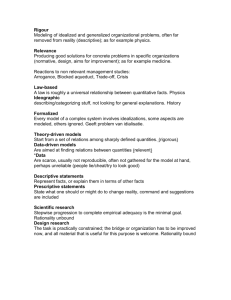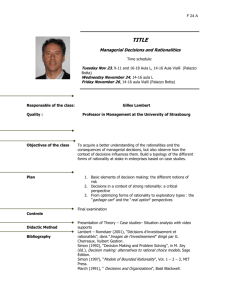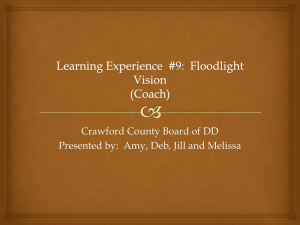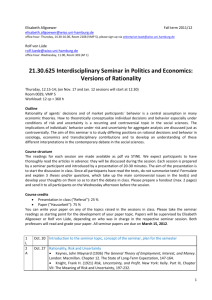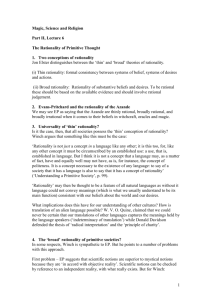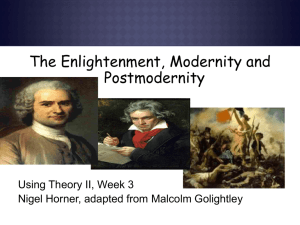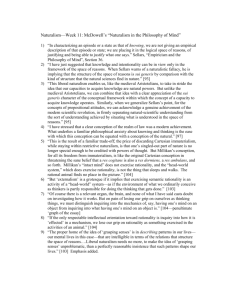Rationality in a Complex World: Pushing Back the Frontiers
advertisement
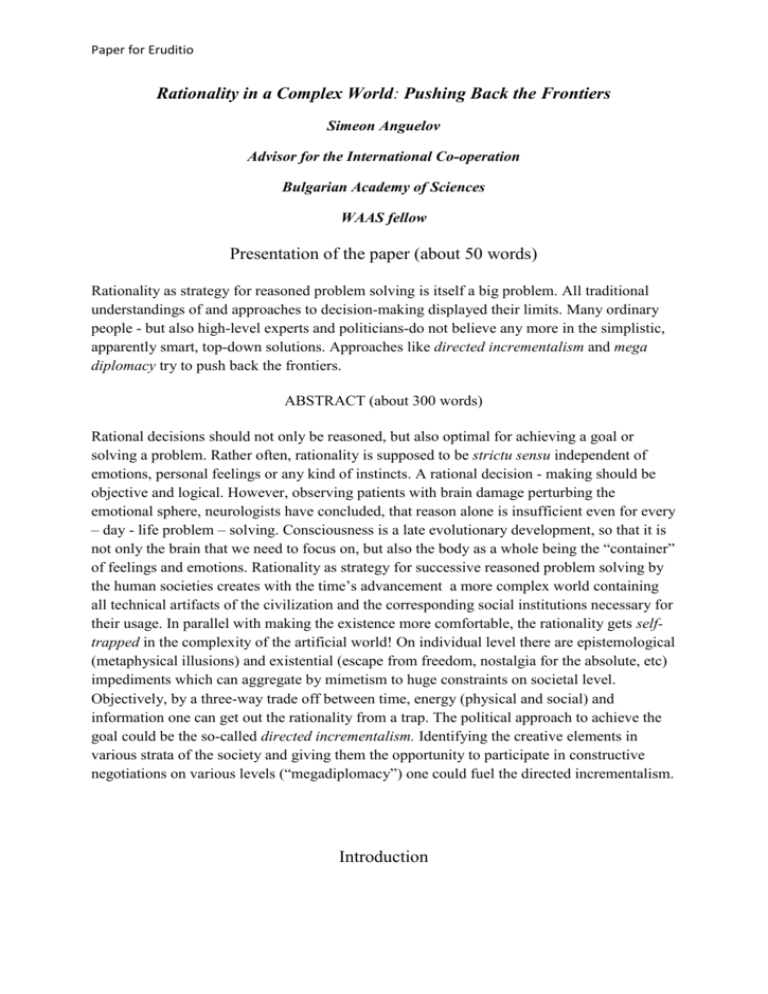
Paper for Eruditio Rationality in a Complex World: Pushing Back the Frontiers Simeon Anguelov Advisor for the International Co-operation Bulgarian Academy of Sciences WAAS fellow Presentation of the paper (about 50 words) Rationality as strategy for reasoned problem solving is itself a big problem. All traditional understandings of and approaches to decision-making displayed their limits. Many ordinary people - but also high-level experts and politicians-do not believe any more in the simplistic, apparently smart, top-down solutions. Approaches like directed incrementalism and mega diplomacy try to push back the frontiers. ABSTRACT (about 300 words) Rational decisions should not only be reasoned, but also optimal for achieving a goal or solving a problem. Rather often, rationality is supposed to be strictu sensu independent of emotions, personal feelings or any kind of instincts. A rational decision - making should be objective and logical. However, observing patients with brain damage perturbing the emotional sphere, neurologists have concluded, that reason alone is insufficient even for every – day - life problem – solving. Consciousness is a late evolutionary development, so that it is not only the brain that we need to focus on, but also the body as a whole being the “container” of feelings and emotions. Rationality as strategy for successive reasoned problem solving by the human societies creates with the time’s advancement a more complex world containing all technical artifacts of the civilization and the corresponding social institutions necessary for their usage. In parallel with making the existence more comfortable, the rationality gets selftrapped in the complexity of the artificial world! On individual level there are epistemological (metaphysical illusions) and existential (escape from freedom, nostalgia for the absolute, etc) impediments which can aggregate by mimetism to huge constraints on societal level. Objectively, by a three-way trade off between time, energy (physical and social) and information one can get out the rationality from a trap. The political approach to achieve the goal could be the so-called directed incrementalism. Identifying the creative elements in various strata of the society and giving them the opportunity to participate in constructive negotiations on various levels (“megadiplomacy”) one could fuel the directed incrementalism. Introduction Paper for Eruditio What follows is a concise overview of the various aspects of the human rationality, and specifically of its limits. If the rationality is an exercise of reason, a mean to derive conclusions when considering things deliberately, a rational decision should not only be reasoned, but also optimal for achieving a goal or solving a problem [1]. Based on such a definition, our first point will be to consider the cognitive mechanisms of decision-making both on individual and societal levels. At a next step, we shall attract attention to the fact that the rational activities of humans and humanity in general make the world progressively more complex, which by a kind of negative feedback impedes the further progress of the rationality. This phenomenon we shall name self-trapping of the rationality. Having stressed that, we shall review the objective factors limiting the rationality in the complex world and how - on their “nano” level- individuals respond to the constraints. Specific impediments of epistemological and psychological (existential) character can act not only on individual level but create by accretion huge constraints to the rationality in the society. The final part of the analysis will try to outline the possible policies for getting out from the traps catching the rationality. Plan of the Article Accordingly, the concise plan of the presentation is as follows: • 1) Complex structure of the human rationality. • 2) Self-trapping of the rationality in the complex world. • 3) Objective factors limiting (trapping) the rationality in a complex world: • 3.1) Material (physical) bounds, • 3.2) Institutional inertia including vested interests, • 3.3) Democratic-voting impossibility, • 3.4) Subjective responses on individual level. • 4) Epistemological and psychological impediments: • 4.1) Metaphysical illusions, nostalgia for the absolute, • 4.2) Apprehensions (lack of confidence, escape from freedom). 5) Pushing back the boundaries 6) Conclusions • 1. Complex structure of the human rationality. Paper for Eruditio Even today rather frequently, rationality is supposed to be strictu sensu independent of emotions, personal feelings or any kind of instincts. A genuine rational decision - making is expected to be objective and logical (Cogito, ergo sum). If the cognitive agent has been influenced by personal emotions, feelings, instincts or culturally specific, moral codes and norms, the decision, or more generally the reaction, should be qualified as irrational. Observing patients with brain damage perturbing the emotional sphere, neurologists, among them Antonio Damasio, have concluded, that reason alone is insufficient even for every – day - life problem - solving [2]. Damage to the prefrontal cortex, can leave the patient apparently intellectually unimpaired but incapable of making rather simple decisions. Paradoxically, the cold “robotic-like” decision-making is closer to the acting of brain-damaged individuals while the normal cognitive agents need their emotional biases in order to make the complicated human decision-making mechanism workable. According to Damasio, Descartes' famous "Cogito ergo sum": “I think, therefore I am" is profoundly mistaken. Consciousness as well as thinking is a late evolutionary development. Long before them, there was feeling; so humans are still primarily feeling organisms! Damasio makes the important point that it is not only the brain that we need to focus on, but also the body as a whole being the “container” of feelings and emotions. A complete logical analysis needs time and supply of information, which usually are not available. The intuition and subconscious feeling of the situation are compensating this shortage. The humans are taking decisions not as robots but as feeling organisms with their capacity of subconscious assessment of the environment. As John Barrow put it [3],”The brain is a staging point in an ongoing evolutionary process. The mind was not evolved for the “purpose” of doing mathematics. Like most evolutionary products it does not need to be perfect, merely better, than previous editions, and sufficiently good to endow a selective advantage”. The philosophers felt this long time ago, surely in different terms. On the role of passions in the social and the political life recently wrote French political scientist, Pierre Hassner [4]. The passions combine the intensity of the emotions and the sustainability of the sentiments. For that reason, they are driving forces influencing the decision-making, hence the evolution of the societies and the interactions among them. He recalls the classification of Thucydide, taken later on by Hobbes and many others, which distinguished three main passions: the fear or the search for security, the greed, or the desire for material possession, and last but not least the honor or the vanity (Plato’s thymos). According to Plato, the latter is the choleric part of the soul, which is between the reason and the instincts. Today, one would call it the passion we need to define our identity against the other individuals and the other social or cultural groups. All these passions or emotions are working together with the reason when the societies as well as the individuals are forging their opinions and decisions. 2. Rationality self-trapped in the complex world. Rationality as strategy for successive reasoned problem solving by active political units [5] (nation - states, empires-civilizations or other politically-organized groupings of states) creates with the time’s advancement a more complex world. (let’s call it WORLD 3 borrowing the metaphor of Popper [6]). Cutting the long story short, in this context we consider World 3 as containing not only the products of science like theories, models and formulae (the objective knowledge in general), but also all technical artifacts of the civilization and the corresponding social institutions created for their usage and management [7]. This World 3 created by the human rationality all along the cultural evolution of the Paper for Eruditio species Homo Sapiens is getting with the time more and more complex. In parallel with making the existence for sure more comfortable, it generates problems more and more difficult to solve rationally. We propose to call this effect self-trapping of the rationality in the complexity of the WORLD 3 created with the means of this same rationality! Examples:(i) after Fukushima 2011 disaster the energy dilemma: develop or not develop further the nuclear power plants in Japan but also elsewhere, (ii) “Merkel’s” dilemma: decreasing the budget deficits and/or striving for further growth but risking public’s debt next increase. Following Pierre Hassner, we shall recall the possibility to interpret the human history as a succession of fears where every “medicine” healing a fear opens the door to a new one. As already Lucretius pointed out, the fear of death, of big natural catastrophes, of big wild beasts created the Gods. On their turn, they became threats: directly, as administrating punishments, and indirectly, as reasons for religious wars. In order to avoid these fears, the secular state has been devised, but this same state pronounced death sentences, involved the citizens in external wars, imposed despotic governments, etc. In order to escape the fears related to such threats, the liberal state substituted it. Softening of the manners and customs contributed to the attenuation of the fears from inter - individual violence and of severe punishments, while the progress of science attenuated the fear from epidemics and natural disasters. However, the fears never disappear, and that of the technologies getting out of control becomes now the overwhelming one. It is easy to see the equivalence of the succession of fears and the succession of general problems getting more complex in the complex world. At a given degree of complexity, the rational solutions appear critically hindered. 3) Objective factors limiting the rationality in a complex world 3.1 Material (physical) bounds As John Barrow pointed out [8]: “There is a three way trade off between time, energy and information that is controlled by the limits on the amount of information that can be obtained with a given energy budget, the energy-time uncertainty principle and the Wigner clock limit.” This means that a short timeframe available or imposed to a given decision-making process could be compensated at least partly by considerable energy and/or information inputs. Low energy resources (physical but also social) impose usage of longer timeframes, which to be shortened need a lot of supplementary information. Limits to the information available (uncertainties) or the limits to the computational capacity will need more energy and longer times for achieving the goal. Eric Drexler said it another way: People who confuse science and technology tend to be confused about limits…they imagine that new knowledge always means new know-how; some even imagine that knowing everything would let us do anything”[9]. 3.2 Institutional inertia and vested interests A large part of the social reality around us is created by the humans [7]. This is also true for the economy and the mechanisms of production and distribution of the goods and services. Paper for Eruditio We have all reasons not to be happy with the economic situation, especially after the big financial catastrophe in 2008[10]. However, could we easily change the institutions created by us? Obviously, not. And this is not only due to the vested interests and the corruption of the political class related to them. Simply speaking, there is a quite objective difficulty related to the institutional inertia, which resembles the inertia of a big battle ship or tanker trying to change the position in trubled waters. We need a lot of physical and social energy directed and managed rationally in order to change the structure of economy or any other social institution with deep roots in the society. 3.3 Democratic-voting impossibility Very often a collective impossibility results from the addition of a number of perfectly rational individual choices [11]. Democratic voting on issues like “pursue the nuclear electricity production or close all nuclear power plants” creates contradictions! As we pass from individual choices to some form of collective choice a paradox arises demonstrated by Kenneth Arrow (1972 Nobel Prize for economics). It seems that more often negotiations are better means of solving dilemmas facing the rationality than democratic voting procedures. 3.4 Subjective responses on individual level The optimization of the interplay between the components of the rationality permits in certain limits adaptation to the objective bounds: (i) the time frame imposed, (ii) the limited information and material resources available, (iii) the degree of preparedness to face the unforeseen, (iv) the overall confidence on the social institutions including the state (their reliability), etc. This is especially clearly visible on the battle field. Clausewitz in On the War says the following for a capable commander [12]: “Intellect which, even in the midst of intense obscurity, is not without some traces of inner light, which lead to the truth, and then the resolution and courage to follow this faint light”,“The mind must first awaken the feeling of courage, and then be guided and supported by it…in momentary emergencies the man is swayed more by his feelings than his thoughts”. The view of Clausewitz corresponds perfectly to Spinosa’s understanding. The latter suggested that the intensities of the affects are usually so strong that the only hope to overcome a harmful affect – an irrational passion- is to struggle against with a more strong positive affect, but generated by the reason. In another words, Spinoza recommended to struggle with a negative emotion with a stronger but positive emotion, provided by the reason [13]. One can argue that both on individual and societal levels with the increasing complexity of the world and the shorter timeframes available, the emotional component of the rationality could become the leading one in the binomial. If passing above a critical threshold, the behaviour of the agent (s) becomes overtly irrational, i.e. overwhelmed by the emotions. 4) Epistemological and psychological impediments to the rationality pushing to irrationalism 4.1 Metaphysical illusions The desire to link all things together is a deep human inclination. Symptomatic dichotomy: the greatest scientific achievements spring from the most insightful and elegant reductions of Paper for Eruditio the superficial complexities of Nature revealing their underlying simplicities, while the greatest blunders (including harmful and misleading ideologies) usually arise from the oversimplification of aspects of reality that subsequently prove to be far more complex than initially supposed (For more details, see again [3]) 4.2 Psychological (existential) impediments Escape from freedom [14] of those who have not the courage to be responsible for their destiny, hence submitting to an authoritarian system.Very often the latter replaces an old order under different external appearance but identical function for the faint - hearted: to eliminate the apprehension and the lack of confidence [15] by prescribing what to think and how to act. This escape from freedom serving as mass support to the totalitarian Governments was underlined by Hanna Arendt [16] :”There is no doubt that in spite of the evidence of its crimes the totalitarian Government has the support of the masses. This is very troublesome. For that reason, it is not astonishing that very often experts and politicians are denying the fact. The first ones believe in the magic effects of the propaganda and the brain washing, while the others as Adenauer simply refused to recognize it.” Nostalgia for the absolute [17] due to the decline of formal religious systems has left a moral and emotional emptiness in Western culture. As consequence, alternative "mythologies" like Marxism, Freudian psychology, Levy-Straussian anthropology and/or fads of irrationalism introduced themselves. 5) Pushing back the boundaries 5.1 Has the irrational been explained rationally? Referring to the intuitions of Spinosa, Schopenhauer, and Clausewitz, stressing the contribution of Freud and the last scientific discoveries of the neurobiology, the answer seems to be yes to a great extent. This pushes to some extent back the boundaries surrounding the rationality. 5.2 Directed Incrementalism Against such a background, how we could push back further the limits to rationality? A possible issue is outlined in [18] pointing at the so-called directed incrementalism. The latter consists in purposeful decision-making guided by clear goals, articulated visions and guiding principles. At first glance, it generates only minor changes in the form of small-scale adaptations to policies, which may appear as merely incremental short-term policy changes, but on the long run emerge as policies clearly leading at stated goals relying mostly on negotiating than on voting. 5.2 Looking for creative minorities The question is who has strong word in the decision- making? Who participates in formulating the concrete realizations of the directed incrementalism? National sovereign Governments, groups of Governments, bankers and other financial and business lobbies? Trade unions? Scientific societies and academies? Non- governmental organizations? A complex blend of them? Paper for Eruditio Arnold Toynbee considered the history as evolution of civilizations. Civilizations arose in response to some set of challenges, when "creative minorities" devised appropriate solutions. By responding to challenges, civilizations grow. They decline when not able to respond creatively further [19]:"Civilizations die from suicide, not by murder.“An example is the empire of Angkor which lasted six centuries in the territory of contemporary Cambodia thanks to the very efficient system of managing and distributing waters [20] According to Georges Coedes, the weakening of Angkor's royal government by ongoing war and the erosion of the cult of the devaraja (God-king) undermined the government's ability to engage in important public works, such as the maintenance of the waterways essential for irrigation of the rice fields. As a result, Angkorian civilization decomposed due to shrinking economic base. 5.3 Role of the negotiations Substituting civilization with any relatively stable active political unit (civilizations are not such ones, but empires or other political groupings corresponding to certain civilizations are) we may agree with Toynbee on the important role of the creative minorities. Identifying such minorities in various strata of the society and giving them the opportunity to participate in constructive negotiations on various levels (“megadiplomacy” [21]) we may fuel reasonably the directed incrementalism. This, probably, is the means we are looking for to liberate the rationality from the self-made traps. What we may really need is less applied science increasing the density of technological “gadgets” in World 3, but much more applied humanities serving the directed incrementalism aiming at the liberation of the society from the traps, among which that of the actual consumerism. Conclusions In Introduction we recalled the definition of a rational decision, which: “ should not only be reasoned, but also optimal for achieving a goal or solving a problem.” Having outlined the emotional or passionate component in the mechanism of human decision making, we should accept that the optimal decisions -sometimes or even very often- are not the apparently most logical ones. This should not disqualify them as being irrational. The appropriate attitude is to look for rational explanation of the respective “irrationality”. At the level of the political units (nation states, empires-civilizations, grouping of states, etc) the rational application of the natural sciences (technologies and technical artifacts) complicated the world. Thus, human rationality solving problems inevitably creates more complex ones. In a way, the complex world resulting from the activities of the rational humans is catching the rationality in self-created traps: the phenomenon of self-trapped rationality. The liberation of the rationality from the self-trapping may need negotiations with the participation of creative minorities in various strata of the society with the view of fueling policies of directed incrementalism. [2] Antonio Damasio, Descartes’ Error Paper for Eruditio [3] John Barrow, Impossibility. The limits of Science and the Science of Limits, Oxford University Press, Oxford 1998, p.232 [4] Pierre Hassner, La revanche des passions, Commentaire, No 110/Ete 2005 [5] For a definition of political unit see Thierry de Montbrial, L’Action et le systeme du monde, PUF, Paris [6] Karl Popper, Unended Quest. An Intellectual Autobiography, Routledge London, 1992, p.180 [7] John R.Searle, The Construction of Social Reality, Penguin Books, 1995 [8] John Barrow, ibidem, p.146 [9] E. Drexler, Engines of Creation, Fourth Estate, London 1990, p.148 [10] Orio Giarini, Garry Jacobs and Ivo Slaus, The Great Divorce: Finance and Economy, Cadmus, April 2012 [11] John Barrow, ibidem, from 239 to p.246. [12] Carl von Clausewitz, On War, abridged version, Oxford World’s Classics, Oxford University Press 2007 [14] Erich Fromm, Escape from Freedom, Avon, New York 1941, next edition with a new foreword by the author 1965 [15] Alain Peyrefitte La societe de confiance, Editions Odile Jacob,Paris 1995 [16] Hannah Arendt, Totalitarianism, Renewed by Mary McCarthy West, published in arrangement wit Harcourt Inc, 1979, from the foreword [17] Georg Steiner, Nostalgie de l’absolu, Bibliotheque10/18 dirige par Jean-Claude Zilberstein, Pari 1974 [18] See the papers in the collection Rationality in an Uncertain World, Gerhard Banse, Imre Hronszky, Gordon Nelson (eds.) Gesellschaft-Technik- Umwelt, Neue folge 5, edition Sigma, Berlin 2005 [19] Arnold Toynbee, Study of History, Wikipedia [20] Georges Coedès, Pour mieux comprendre Angkor, Wikipedia [21] Parag Khanna, How to Run the World. Charting the Course to Next Renaissance, Random House, New York 2011
